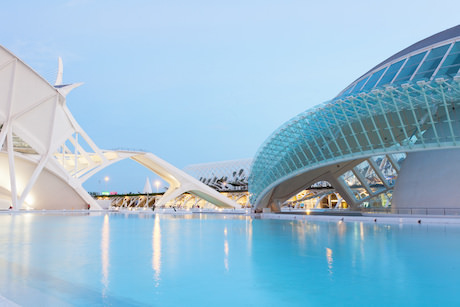Valencia is Spain's third largest city and the capital of the region of the same name. A quick look at the map shows that Valencia is located on the eastern coast of Spain towards the Mediterranean Sea, just south of Barcelona . Valencia is a vibrant metropolis that grows every year and the city is truly buzzing with life. It is said, for example, that Valencia has the best nightlife in Spain, and that is saying a lot.
Entertainment Valencia
As the regional capital and as the third largest city in party-happy Spain, you can easily figure out that the entertainment scene in Valencia is something very special. In fact, today Valencia is known for its entertainment even outside of Spain. In Valencia, people live by the mantra "vivir sin dormir" (live without sleep) and if there is something that really characterizes the entertainment life in Valencia, it is that it starts late at night and does not end until it is almost time to start a new day .
The largest part of entertainment can be found in the city's old quarters in the center. There are also places to have fun around Valencia's two beaches. No matter where you go, you can experience the hospitality that the residents are known for.
The biggest single event on the entertainment calendar in Valencia is Las Fallas (Les Falles in Valencian) which takes place between the 15th and 19th of March each year. During the five days, festivities of a large kind take place and there is really no end to the range of entertainment.
Sights Valencia
Valencia has something for all tastes. Here there are cultural sights in abundance, a rich entertainment scene and excellent shopping. In addition, you can watch world-class football when the pride of the city, Valencia CF, plays at the Mestalla. During the last period of greatness, which lasted from 1999-2004, they won two league titles, the UEFA Cup, a trophy in the domestic cup, as well as reaching the final of the Champions League twice (however, they lost both). The old 1994 hero Joakim Björklund also played here when it happened.
The city's old history means that there are some historical sights to see. Most of them are centrally located (Cuitat Vella) on the Turia River. However, most of the sights in today's Valencia are ultra-modern.
For example, Valencia is home to one of the largest experience centers in the world, the Ciutat de les Arts i les Ciènces . Almost in the middle of the city there are cinemas with laser shows, a science museum, a music palace, a botanical garden, as well as the largest oceanographic park in Europe.
History
The history of Valencia starts in 137 BC. when the Romans established a colony on the site. The colony did not make any further impression in the history books, but the entry of the Moors in 714 AD did. The Moors created a prosperous city with large plantations (Valencia is still today a city famous for its oranges) and the city was one of the most important for several hundred years.
In 1094, El Cid, the conqueror of the Moors, came to Valencia to try to retake the city. He succeeded in this, but it was not many years before the Moors were back. The one who finally retook the city was King Jaime I of Aragon.
During the Middle Ages, Valencia was a kingdom, and a very prosperous one at that. The strength of the kingdom meant that it was possible to stand up against the central government. However, it was not popular with King Philip V, who after the War of the Spanish Succession, when Valencia sided with the Habsburgs, abolished the city's privileges.
As an autonomous region of Spain, Valencia has been self-governing since 1982.
Flights and other communications
Valencia has excellent communications with all modes of transport. The Spanish AVE high-speed trains serve the city (both from/to Madrid and Barcelona) and the city connects a large number of motorways in all directions.
The airport in Valencia, Aeropuerto de Valencia-Manises, is located about a mile west of the city center. The airport is a base for both major airlines and low-cost airlines, which means that it is possible to fly both regularly and with cheaper tickets to Valencia. Read tips on cheap flights.
Weather in Valencia Valencia's climate is a mix of a subtropical climate and a Mediterranean climate. This means that it is relatively warm (measured by Swedish eyes) all year round. It is only December-January that the temperature can go below ten degrees. The season for swimming is long and the sea is at least 20 degrees between June and November.

